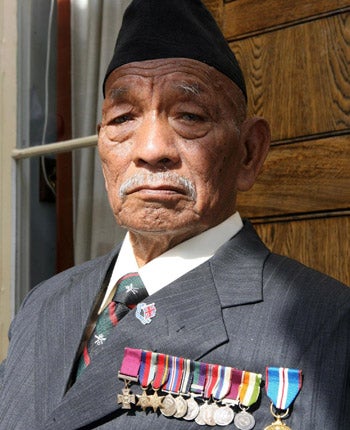Lt Tul Bahadur Pun VC: Rifleman decorated for his bravery in Burma

Your support helps us to tell the story
From reproductive rights to climate change to Big Tech, The Independent is on the ground when the story is developing. Whether it's investigating the financials of Elon Musk's pro-Trump PAC or producing our latest documentary, 'The A Word', which shines a light on the American women fighting for reproductive rights, we know how important it is to parse out the facts from the messaging.
At such a critical moment in US history, we need reporters on the ground. Your donation allows us to keep sending journalists to speak to both sides of the story.
The Independent is trusted by Americans across the entire political spectrum. And unlike many other quality news outlets, we choose not to lock Americans out of our reporting and analysis with paywalls. We believe quality journalism should be available to everyone, paid for by those who can afford it.
Your support makes all the difference.The Victoria Cross won by the young Rifleman Tul Bahadur Pun was awarded for his outstanding courage and superb gallantry in the face of extraordinary odds.
In the sweltering heat of Burma on 23 June 1944 the 6th Gurkha Rifles attacked a railway bridge atMogaung but were immediately counter-attacked by Japanese forces, who opened up concentrated andsustained fire from two positions, a well-prepared bunker and a position named Red House approximately 200 yards apart.
As Tul Bahadur Pun's sectionadvanced it was wiped out apart from his section commander, one other man and himself. Their predicament was grim, but the section commander bravely continued his attack onthe Red House but fell badly wounded. Tul Bahadur Pun continued withthe last survivor, who was also seriously wounded.
Now alone, he picked up a Bren gun and, firing from the hip, continued his charge under intense fire. He was now in mud up to his ankles and dodging shell holes and fallen trees. With dawn approaching he presented a perfect target to the Japanese, who continued to pour down a concentration of automatic fire straight at him.
Despite the overwhelming conditions he reached the Red House and in close-quarter fighting killed three of the enemy and watched as five others ran for their lives. He then took over the Japanese machine gun which had caused his section so many losses and gave accurate supporting fire from the Red House, which enabled his platoon to capture their objective. He was presented with his VC by Field Marshall Viscount Wavell at a special parade in Delhi in March 1945.
Tul Bahadur Pun was born in either 1919 or 1923 – local Burmese records were inaccurately held at the time – in a small village in West Nepal. He joined the 3rd Battalion 6th Gurkha Rifles as a teenager and was soon involved in the Chindit campaign. After India gained independence in 1947 he elected to join the British Army with the 2nd/6th Gurkha Rifles and saw extensive action in Malaya. He retired from the army as a Regimental Sergeant-Major in 1959 and was given the honorary rank of Lieutenant.
One of the many lives he savedby is courageous action that daywas that of Major James Lumley, the father of the actress Joanna, who has worked tirelessly on behalf ofthe Gurkhas to enable them to settle in this country in their retirement.Tul Bahadur Pun was eventuallyallowed to come to this country with his family in 2007 and settled in Hounslow, where he was made a Freeman, and last year he moved to Chiswick. He died in Nepal while on a visit to his native village to oversee the inauguration of a new school in which he had been involved.
Tul Bahadur Pun, soldier: born Myagdi District, Nepal 23 March 1919 or 1923; Victoria Cross 1944; married twice (two sons, eight daughters); died Myagdi District, Nepal 20 April 2011.
Join our commenting forum
Join thought-provoking conversations, follow other Independent readers and see their replies
Comments